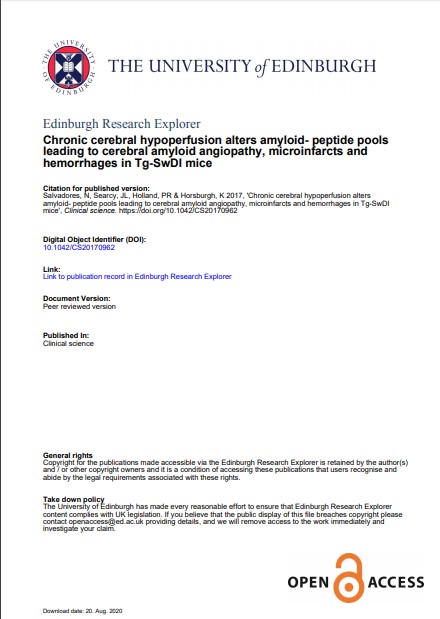Chronic cerebral hypoperfusion alters amyloid-β peptide pools leading to cerebral amyloid angiopathy, microinfarcts and haemorrhages in Tg-SwDI mice

Fecha
2017Autor
Searcy J.L., Holland P.R., Horsburgh K.
Salvadores, Natalia [Centro de Biología Integrativa, Universidad Mayor, Chile]
Ubicación geográfica
Notas
HERRAMIENTAS
Acceda a títulos restringidos
¿Cómo descargar?Resumen
Cerebral hypoperfusion is an early feature of Alzheimer's disease (AD) that influences the progression from mild cognitive impairment to dementia. Understanding the mechanism is of critical importance in the search for new effective therapies. We hypothesized that cerebral hypoperfusion promotes the accumulation of amyloid-β (Aβ) and degenerative changes in the brain and is a potential mechanism contributing to development of dementia. To address this, we studied the effects of chronic cerebral hypoperfusion induced by bilateral carotid artery stenosis on Aβ peptide pools in a transgenic mouse model of AD (transgenic mice with Swedish, Dutch and Iowa mutations in human amyloid precursor protein (APP) (Tg-SwDI)). Cerebrovascular integrity was characterized by quantifying the occurrence of microinfarcts and haemorrhages and compared with wild-type mice without Aβ. A significant increase in soluble Aβ peptides (Aβ40/42) was detected after 1 month of hypoperfusion in the parenchyma in parallel with elevated APP and APP proteolytic products. Following 3 months, a significant increase in insoluble Aβ40/42 was determined in the parenchyma and vasculature. Microinfarct load was significantly increased in the Tg-SwDI as compared with wild-type mice and further exacerbated by hypoperfusion at 1 and 3 months. In addition, the number of Tg-SwDI hypoperfused mice with haemorrhages was increased compared with hypoperfused wild-type mice. Soluble parenchymal Aβ was associated with elevated NADPH oxidase-2 (NOX2) which was exacerbated by 1-month hypoperfusion. We suggest that in response to hypoperfusion, increased Aβ production/deposition may contribute to degenerative processes by triggering oxidative stress promoting cerebrovascular disruption and the development of microinfarcts.
URI
https://portlandpress.com/clinsci/article-abstract/131/16/2109/71640https://doi.org/10.1042/CS20170962
https://www.research.ed.ac.uk/portal/files/61150547/manuscript_final_NS.pdf
http://repositorio.umayor.cl/xmlui/handle/sibum/6985
Coleccion/es a la/s que pertenece:
Si usted es autor(a) de este documento y NO desea que su publicación tenga acceso público en este repositorio, por favor complete el formulario aquí.